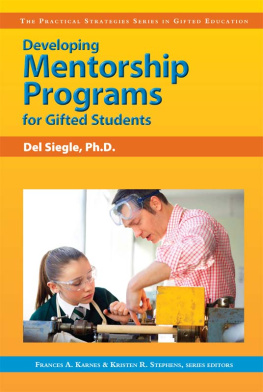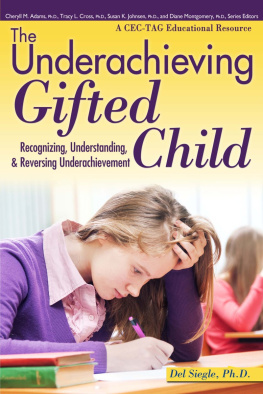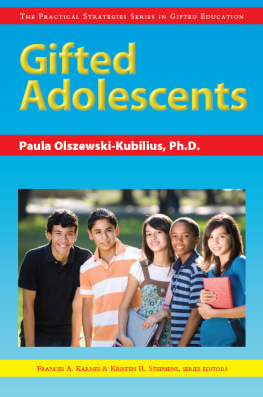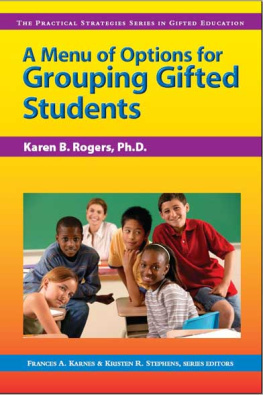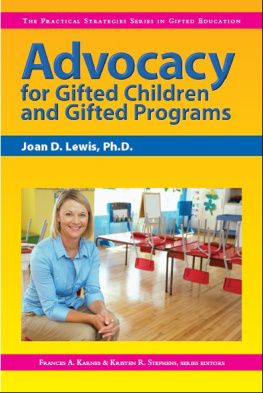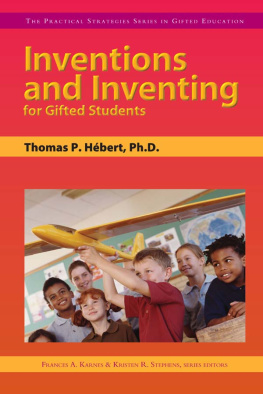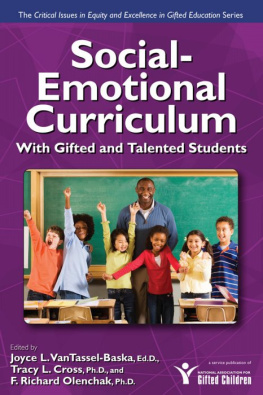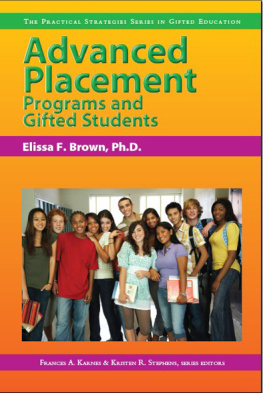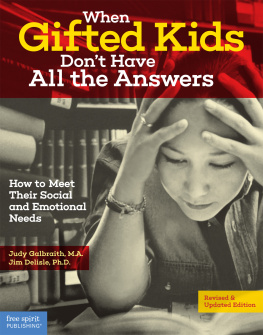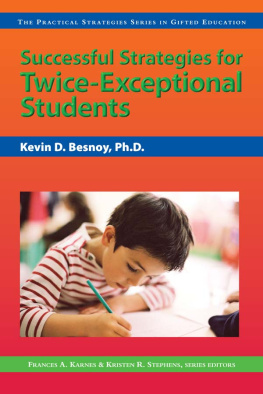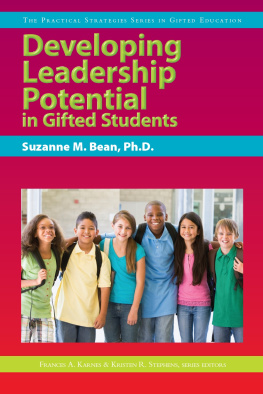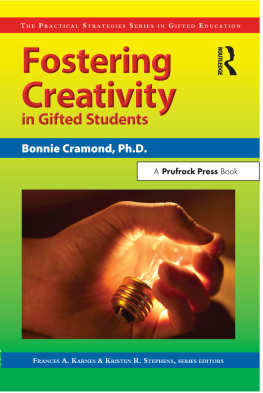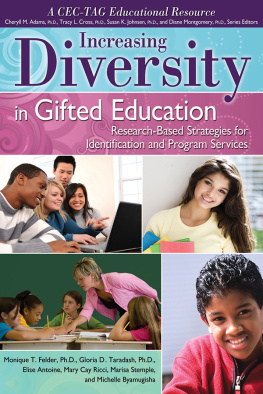Del Siegle - Developing Mentorship Programs for Gifted Students
Here you can read online Del Siegle - Developing Mentorship Programs for Gifted Students full text of the book (entire story) in english for free. Download pdf and epub, get meaning, cover and reviews about this ebook. year: 2005, publisher: Sourcebooks, Inc., genre: Home and family. Description of the work, (preface) as well as reviews are available. Best literature library LitArk.com created for fans of good reading and offers a wide selection of genres:
Romance novel
Science fiction
Adventure
Detective
Science
History
Home and family
Prose
Art
Politics
Computer
Non-fiction
Religion
Business
Children
Humor
Choose a favorite category and find really read worthwhile books. Enjoy immersion in the world of imagination, feel the emotions of the characters or learn something new for yourself, make an fascinating discovery.
- Book:Developing Mentorship Programs for Gifted Students
- Author:
- Publisher:Sourcebooks, Inc.
- Genre:
- Year:2005
- Rating:4 / 5
- Favourites:Add to favourites
- Your mark:
- 80
- 1
- 2
- 3
- 4
- 5
Developing Mentorship Programs for Gifted Students: summary, description and annotation
We offer to read an annotation, description, summary or preface (depends on what the author of the book "Developing Mentorship Programs for Gifted Students" wrote himself). If you haven't found the necessary information about the book — write in the comments, we will try to find it.
Part of Prufrock Press Practical Strategies Series in Gifted Education, Developing Leadership Potential in Gifted Students offers practical advice for helping gifted students develop their leadership potential.
Del Siegle: author's other books
Who wrote Developing Mentorship Programs for Gifted Students? Find out the surname, the name of the author of the book and a list of all author's works by series.
Developing Mentorship Programs for Gifted Students — read online for free the complete book (whole text) full work
Below is the text of the book, divided by pages. System saving the place of the last page read, allows you to conveniently read the book "Developing Mentorship Programs for Gifted Students" online for free, without having to search again every time where you left off. Put a bookmark, and you can go to the page where you finished reading at any time.
Font size:
Interval:
Bookmark:
THE PRACTICAL STRATEGIES SERIES
IN GIFTED EDUCATION
series editors
FRANCES A. KARNES & KRISTEN R. STEPHENS
Developing
Mentorship Programs
for Gifted Students
Del Siegle

P RUFROCK P RESS , I NC .
Copyright 2005 by Frances A. Karnes
and Kristen R. Stephens-Kozak
All rights reserved.
No part of this book may be reproduced, translated, stored in a retrieval system, or transmitted, in any form or by any means, electronic, mechanical, photocopying, microfilming, recording, or otherwise, without written permission from the publisher.
Printed in the United States of America.
ISBN-13: 978-1-59363-768-2
At the time of this books publication, all facts and figures cited are the most current available. All telephone numbers, addresses, and Web site URLs are accurate and active. All publications, organizations, Web sites, and other resources exist as described in the book, and all have been verified. The authors and Prufrock Press, Inc., make no warranty or guarantee concerning the information and materials given out by organizations or content found at Web sites, and we are not responsible for any changes that occur after this books publication. If you find an error, please contact Prufrock Press, Inc. We strongly recommend to parents, teachers, and other adults that you monitor childrens use of the Internet.

Prufrock Press, Inc.
P.O. Box 8813
Waco, Texas 76714-8813
(800) 998-2208
Fax (800) 240-0333
http://www.prufrock.com
Contents
Series Preface
The Practical Strategies Series in Gifted Education offers teachers, counselors, administrators, parents, and other interested parties up-to-date instructional techniques and information on a variety of issues pertinent to the field of gifted education. Each guide addresses a focused topic and is written by scholars with authority on the issue. Several guides have been published. Among the titles are:
Acceleration Strategies for Teaching Gifted Learners
Curriculum Compacting: An Easy Start to Differentiating for High-Potential Students
Enrichment Opportunities for Gifted Learners
Independent Study for Gifted Learners
Motivating Gifted Students
Questioning Strategies for Teaching the Gifted
Social & Emotional Teaching Strategies
Using Media & Technology With Gifted Learners
For a current listing of available guides within the series, please contact Prufrock Press at (800) 998-2208 or visit http:// www.prufrock.com.
What Is Mentoring?
A single conversation across the table with a wise man is worth a months study of books.
Chinese proverb
Mentoring has existed for as long as one generation has passed its wisdom to another (Tomlinson, 2001). The basis for the term originated in Homers Odyssey. Odysseus left his trusted friend Mentor in charge of his household and his son Telemachus during his absence. Athena later disguised herself as Mentor and guided Telemachus in his search for his father (Pennsylvania State University, 19992002).
Mentoring involves a more knowledgeable and experienced individual helping a less experienced individual reach a major life goal (Goff & Torrance, 1999; Tomlinson, 2001). This relationship can range from a formal arrangement that is carefully planned and executed to a serendipitous meeting of like-minded individuals with a common interest (Nash, 2001; Tomlinson). The relationship is based on trust and a genuine desire for growth and learning (Goff & Torrance, 1999).
Mentors are more than role models. In addition to providing skills, they support and challenge as they help their younger charges develop a vision for the future (Kaufmann, 2003). They teach, counsel, engage, and inspire (Nash, 2001) and often serve as friends throughout the process (Silverman, 2000).
Mentorship programs can provide motivated gifted and talented students with an opportunity to apply inductive thinking and problem-solving skills to advanced content that is often associated with real-life situations. Mentorships generally serve one or more of the following student goals:
- career explorations,
- research beyond the scope of the regular classroom,
- opportunity to study topics not available in the regular curriculum,
- development of specific skills, and
- opportunity to work with experts in fields of interest (Idaho, 1999).
Three groups of gifted and talented students particularly benefit from mentorships: highly gifted, disadvantaged, and underachieving students. The highly gifted need challenges well beyond the schools resources; the disadvantaged profit from significant role models, career and college counseling, and possibly summer employment and scholarship opportunities; the underachieving benefit from meaningful learning experiences, individual attention, and a change from the status quo (VanTassel-Baska, 2000)
At the core of mentoring is the practice of mentors recognizing young peoples talents and interests and providing opportunities to explore and develop their skills (Siegle & McCoach, 2005). Mentoring has withstood the test of time because it works under a variety of conditions with individuals of all ages. Mentoring at an early age helps young people recognize and appreciate their own uniqueness (Bennetts, 2001) as they pursue their talents and creativity (Torrance, 1984). Older students benefit even more from mentoring experiences (Roberts & Inman, 2001). Adolescents enjoy working with others apart from their families. They benefit from opportunities for collaboration, assistance with the transition from youth to young adulthood, college and career guidance, chances for choice, and development of their esoteric interests (Bennetts, 2001).
Torrance (1984) documented that mentors make a difference in the educational attainment and creative achievement of their mentees. Students in mentoring relationships have better school attendance, are more likely to attend college, and have better attitudes towards school (Jekielek, Moore, Hair, & Scarupa, 2002). Mentored students stay in school longer and accomplish more as adults (Torrance, 1984). Mentorships increase student self-confidence and self-awareness (Nash, 2001). They promote responsibility and the importance of preparing for the future (Purcell, Renzulli, McCoach, & Spottiswoode, 2001). This includes improved organization and time management skills (Davalos & Haensly, 1997). In addition, when youth enjoy a regular, positive activity with an adult over the course of a year, they are 46% less likely to begin using drugs, 27% less likely to begin using alcohol, and 52% less likely to skip school. (Charityguide, n.d., p. 1)
Gifted students need for advanced knowledge, inductive learning through exploration and problem solving, and diverse interests make them ideal candidates for mentoring experiences. Gifted and talented students learn more deeply and at an accelerated pace which necessitates assistance beyond conventional classroom and home environments. They need to investigate the complexities and interrelationships among disciplines that can only be discovered with assistance from highly knowledgeable experts. Mentors are also necessary when gifted and talented students have interests that their peers are not prepared to explore (Robert & Inman, 2001). Classroom teachers, gifted and talented specialists, and parents may lack the specialized knowledge necessary to develop gifted students talents. Mentors provide a level of sophistication and intensity of interest that is normally not accessible from traditional sources (Siegle, 2001). Mentors and mentees form a partnership where they explore their passions and interests (Roberts & Inman, 2001) and unique knowledge and talents (Nash, 2001). The mentee engages in real world learning and has an opportunity to study content in a ceilingless environment beyond the confines of the classroom curriculum (Davalos & Haensly, 1997).
Next pageFont size:
Interval:
Bookmark:
Similar books «Developing Mentorship Programs for Gifted Students»
Look at similar books to Developing Mentorship Programs for Gifted Students. We have selected literature similar in name and meaning in the hope of providing readers with more options to find new, interesting, not yet read works.
Discussion, reviews of the book Developing Mentorship Programs for Gifted Students and just readers' own opinions. Leave your comments, write what you think about the work, its meaning or the main characters. Specify what exactly you liked and what you didn't like, and why you think so.

